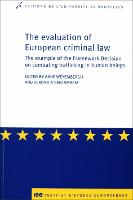The evaluation of European criminal law
The example of the Framework Decision on combating trafficking in human beings
Author(s)
Ambrož, Matjaž
Bosch, Laura C.
Böse, Martin
Chatzinikolaou, Nikolaos
De Hert, Paul
Javier de León, Francisco
Gamberini, Giulietta
Giannakoula, Athina
Grasso, Giovanni
Kaiafa-Gbandi, Maria
Łazowski, Adam
Ligeti, Katalin
Lucifora, Annalisa
Maroto, Manuel
Millen, Jürgen
Papakyriakou, Theodor
Plesničar, Mojca M
Poelemans, Maitena
Ángel Rodríguez, Miguel
Roth, Robert
Santamaria, Veronica
Spencer, John R.
Švedas, Gintaras
Weyembergh, Anne
Contributor(s)
Weyembergh, Anne (editor)
Santamaria, Veronica (editor)
Language
English; FrenchAbstract
The role of evaluation has become increasingly important in the context of EU policies in the field of judicial cooperation in criminal matters. This evolution is the result of an increasing number of legally binding instruments adopted in the framework of the third pillar of the European Union and of their growing impact on national legal systems.
Keywords
European Studies; Criminal LawPublisher
Editions de l'Université de BruxellesPublisher website
http://www.editions-ulb.be/en/Publication date and place
Bruxelles, 2009Series
European Studies,Classification
Public international law: criminal law


 Download
Download Web Shop
Web Shop